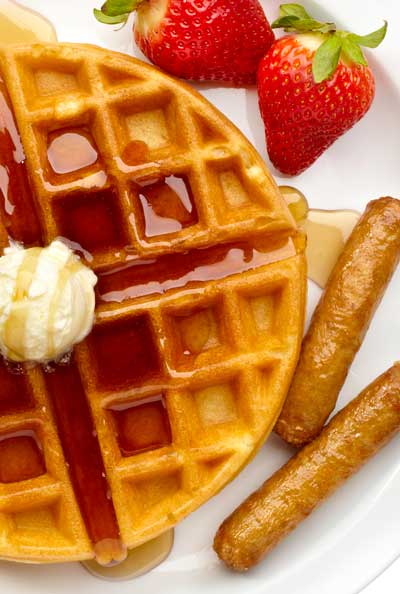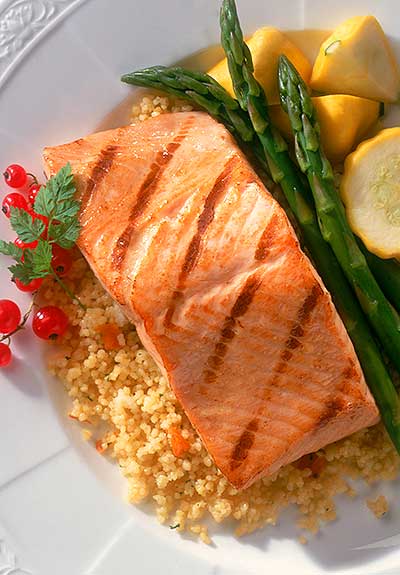Foods That Fight Depression
The more we rely on food as our “medicine,” the less we need actual medicine. That may be especially important for conditions, like depression, in which the pharmaceuticals prescribed often come with the possibility of many negative side effects, such as increased appetite and weight gain, fatigue, insomnia, loss of sexual desire, erectile dysfunction, constipation, dry mouth, blurred vision, nausea, and even increased risk of cardiovascular disease.

Sallie’s not alone. More and more studies are finding that we may be able to fend off depression simply by eating better.
Foods that fight depression
The evidence was presented at the American Academy of Neurology’s 70th Annual Meeting in Los Angeles.1
Scientists from Rush University Medical Center in Chicago followed 964 older men and women for 6.5 years. At the study’s start, all the participants completed detailed dietary questionnaires. Every year, they were monitored for symptoms of depression.

At the study’s conclusion, the researchers, led by Laurel Cherian, MD, MS, found that the participants whose diets most closely resembled the Dietary Approaches to Stop Hypertension (DASH) diet were less likely to develop depression compared to all the other participants.
- High consumption of fruits, vegetables, whole grains, and legumes (beans)
- Very low consumption of foods high in saturated fat, such as red meat and full-fat dairy foods like whole milk and cheese
- Very low consumption of sugar and salt
Foods linked with depression
The study also found that the more the participants followed a typically Western-style diet (high in saturated fats and low in fruits, vegetables, and whole grains), the greater their risk of developing depression.
At the American Academy of Neurology meeting, Dr. Cherian was quick to point out that her study only established a link between diet and depression, not cause-and-effect.
But previous data have also found a strong connection between the foods we eat and depression.
Healthy dietary pattern
In 2017, for example, a meta-analysis2 that combined the results of 21 studies from 10 countries concluded that a healthy dietary pattern may decrease the risk of depression. A healthy dietary pattern was defined as:
- High in fruit
- High in vegetables
- High in whole grains
- High in fish
- Low in animal foods like meat and fatty dairy foods
Worst diet
Moreover, the risk of developing depression increased with a diet that was:
- High in red and/or processed met
- High in refined grains like white bread
- High in sweets
- High in fatty dairy products like butter, whole milk, and cheese
- Low in fruits and vegetables

“Diet, a new target to prevent depression?”
Similarly, in a study3 published in 2013 titled “Diet, a new target to prevent depression?” scientists from Spain analyzed more than 15,000 patient records, which included the patients’ dietary patterns.
At the start of the study, in 1999, none of the patients had been diagnosed with depression. By the study’s end, more than a decade later, 1,550 had received a diagnosis of depression and/or taken anti-depressants.
The researchers, led by Almudena Sánchez-Villegas, PhD, of the University of Las Palmas de Gran Canaria, reported that the diet associated with the biggest reduction in depression risk was high in:
- Fruits
- Vegetables
- Beans
- Nuts
Which came first? A crummy diet or depression?
Now, it certainly could be argued that depression brings on poor eating habits rather than the other way around. There are plenty of us who know how easy it is to put away several slices of pizza (or the whole darn pizza) when we’re feeling blue.
Inflammation
But provocative research is now learning that the actual genesis of depression may somehow be related to chronic inflammation.
Scientists are discovering that high levels of inflammatory markers like high-sensitivity C-reactive protein and inflammatory cytokines are linked with greater rates of depression.4
Research is also finding that you can induce depression by inducing inflammation,5 all of which suggests that depression may be, at least in part, an inflammatory condition.
Quelling inflammation
A healthy diet like the Pritikin Eating Plan may help quell these inflammatory fires, and, in doing so, help fend off depression.
Just two to three weeks of following the Pritikin Program of diet and exercise has been proven to dramatically lower markers of chronic inflammation like high-sensitivity C-reactive protein as well as inflammatory cytokines in both adults6 and children.7
Bottom Line | Foods That Fight Depression
An overwhelming body has affirmed that a healthy diet like the Pritikin Eating Plan may be our best bet for reducing heart disease, type 2 diabetes, hypertension, and excess weight. And now, new research is learning that diets like Pritikin may also be effective in reducing the risk of cognitive concerns, from Alzheimer’s to depression.
And certainly, the more we rely on food as our “medicine,” the less we need actual medicine.
That may be especially important for conditions, like depression, in which the pharmaceuticals prescribed often come with the possibility of many negative side effects, such as increased appetite and weight gain, fatigue, insomnia, loss of sexual desire, erectile dysfunction, constipation, dry mouth, blurred vision, nausea, and even increased risk of cardiovascular disease.
Alternative to pills
“I don’t think there’s any question that a healthy diet and lifestyle like the Pritikin Program may be a far safer way to prevent and perhaps treat depression than just reaching for the prescription pad,” sums up Dr. Danine Fruge, MD, ABFP, Medical Director of the Pritikin Longevity Center.
The better the food we eat, the healthier we are, and in all sorts of ways, including our outlook on life.
The proof is in the science, but for those of us who work here at Pritikin, the proof is also in what we’ve seen with our guests. Many arrive here feeling, as they tell us, ‘not the best.’ They’re tired, listless, and often anxious. Many admit to feelings of depression.
“More joy… more color.”
But within days here at Pritikin, we start seeing the transformation. There’s a new pep in people’s steps. There’s laughter. There’s a lot more joy, more life, more hope, and yes more color.
Sources
- 1 American Academy of Neurology Annual Meeting, 2018
- 2 Psychiatry Research, 2017; 253: 373.
- 3 BMC Medicine, 2013; 11: 3.
- 4 Progress In Neuropsychopharmacology & Biological Psychiatry, 2014; 53: 23.
- 5 The Journal of the Pakistan Medical Association, 2013; 63 (7): 899.
- 6 Diabetes Research and Clinical Practice, 2006; 73 (3): 249.
- 7 American Journal of Physiology: Endocrinology and Metabolism, 2013; 303 (4): E542.